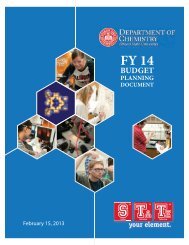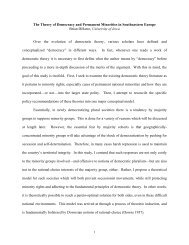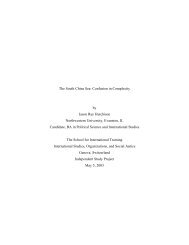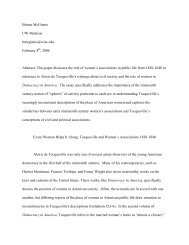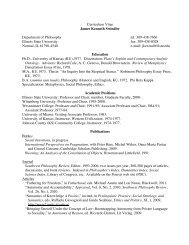1 Procedural and Substantive Conceptions of Democracy in Four ...
1 Procedural and Substantive Conceptions of Democracy in Four ...
1 Procedural and Substantive Conceptions of Democracy in Four ...
You also want an ePaper? Increase the reach of your titles
YUMPU automatically turns print PDFs into web optimized ePapers that Google loves.
Individuals with higher levels <strong>of</strong> political <strong>in</strong>terest are also more likely to spend time learn<strong>in</strong>g<br />
about <strong>and</strong> engag<strong>in</strong>g with political content <strong>in</strong> critical ways, <strong>and</strong> to simply th<strong>in</strong>k more about the topic (Judd<br />
& Krosnick 1989). Furthermore, political cognition literature suggests that higher levels <strong>of</strong> <strong>in</strong>terest <strong>in</strong><br />
politics are associated with greater political sophistication (Lusk<strong>in</strong> 1987, 889). Thus, we expect those<br />
who are more <strong>in</strong>terested <strong>in</strong> politics to be more likely to def<strong>in</strong>e democracy <strong>in</strong> formal, procedural terms.<br />
Similarly, those who actively participate <strong>in</strong> the political activities have direct experience with the<br />
procedural elements <strong>of</strong> governance. People who have voted <strong>in</strong> elections, engaged <strong>in</strong> protests, or organized<br />
petition campaigns are more likely to po<strong>in</strong>t to structural factors that provide avenues for citizens to<br />
<strong>in</strong>fluence government policy as essential to democracy.<br />
Projection Based Factors<br />
As discussed above, large majorities <strong>of</strong> the respondents <strong>in</strong> our sample express support for the idea<br />
<strong>of</strong> a democratic system <strong>of</strong> government <strong>and</strong> we expect a variety <strong>of</strong> <strong>in</strong>dividual level characteristics to lead<br />
people to project their desire for specific substantive outcomes onto the term democracy. Specifically we<br />
expect people who are particularly concerned with remedy<strong>in</strong>g economic <strong>in</strong>equalities <strong>and</strong> ensur<strong>in</strong>g that<br />
everyone‘s basic needs are met to tend to def<strong>in</strong>e democracy as a system that produces these outcomes. We<br />
focus on four <strong>in</strong>dividual level characteristics: family <strong>in</strong>come, subjective assessments <strong>of</strong> economic<br />
conditions, religious observance, <strong>and</strong> gender.<br />
There are two reasons to expect that <strong>in</strong>dividuals who have greater economic resources are more<br />
likely to conceive <strong>of</strong> democracy <strong>in</strong> terms <strong>of</strong> procedural characteristics rather than substantive outcomes.<br />
The first is simply that, because they are less likely to be directly affected by concerns like social<br />
<strong>in</strong>equality or lack <strong>of</strong> basic goods <strong>and</strong> services, <strong>in</strong>dividuals with greater resources are less likely to project<br />
remedy<strong>in</strong>g these problems onto the idea <strong>of</strong> democracy. The second reason is that accord<strong>in</strong>g to Maslow‘s<br />
hierarchy <strong>of</strong> needs, if basic necessities are taken care <strong>of</strong>, an <strong>in</strong>dividual has greater freedom to th<strong>in</strong>k about<br />
<strong>and</strong> pursue more abstract self fulfillment issues (1943). These two related factors suggest a dynamic<br />
where people who do not have to worry constantly about feed<strong>in</strong>g their family are less likely to project the<br />
substantive goal <strong>of</strong> address<strong>in</strong>g economic problems onto the idea <strong>of</strong> democracy. Thus, we expect that<br />
9



